In the end, all the drama was reserved for the law courts. The Board of Control for Cricket in India (BCCI) held its annual elections yesterday, along with its Annual General Meeting.
There were no surprises, with N Srinivasan — under fire after son-in-law M Gurunath was named in a Mumbai police charge sheet in connection with illegal betting on Indian Premier League (IPL) matches — elected unopposed as board president.
It will be his third year in office, assuming the courts allow him to assume the role.
India’s supreme court had given him the go-ahead to contest the elections last Friday, even as it said that he could not take office until it had heard the cases against him and the BCCI that are currently before it.
There was acerbic comment, too, with AK Patnaik and JS Kehar, the two justices on the bench, asking: “Why is he in charge if his son-in-law is charge-sheeted?
“Why are you [Srinivasan] so keen to be elected?”
Following Gurunath’s arrest last May, Srinivasan had stepped down from the daily running of the board, handing over that responsibility to Jagmohan Dalmiya, a one-time enemy.
But come election time, the cloud hanging over Gurunath was no longer a factor. The BCCI’s elaborate electoral processes, designed to help those in power consolidate it, did not hurt.
Since Srinivasan is a representative from South Zone featuring the associations of Tamil Nadu, Karnataka, Hyderabad, Andhra Pradesh, Kerala and Goa – it would have needed opposition from within for his candidacy to be opposed.
Had two of the southern associations endorsed another candidate, it would have necessitated an election.
Goa and Andhra were thought to be the doubtful votes, but promises made clearly smoothed over the process.
Andhra’s G Ganga Raju has been appointed head of the finance committee, while Goa’s Vinod Phadke is in charge of the media committee.
Other supporters have also been rewarded. Rajiv Shukla, who resigned as IPL chairman after the final last May, has been named a vice-president from the central zone.
A minister in the Indian government, Shukla will continue his role as the BCCI’s troubleshooter in Delhi. With all the controversy around, he could have his hands full.
In the days leading up to the election, there were a few murmurs of opposition to Srinivasan’s candidacy. But when it came to the crunch, the usual games of you-scratch-my-back-and-I-scratch-yours played out.
These are testing times for the BCCI. They need to find a new title sponsor for India’s home matches, and possibly a new team sponsor as well.
The concerns of those corporations that have pumped millions into the IPL need to be assuaged.
Following the IPL scandal in May, there were serious concerns that Pepsi, just a year into their deal as the tournament’s title sponsor, would walk away.
What this election has shown, though, is the BCCI’s tendency to close ranks in a crisis.
For all the brief brave quotes in front of microphones a few months ago, and the platitudes about introspection and fresh starts, this was a grim reminder that some things never change.
So much muck has been swept under that carpet that even a proper airing is unlikely to save it.
sports@thenational.ae





